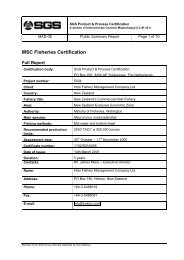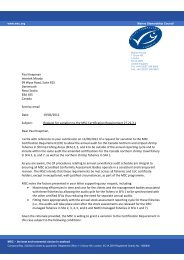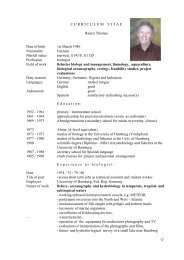SGS Product & Process Certification - Marine Stewardship Council
SGS Product & Process Certification - Marine Stewardship Council
SGS Product & Process Certification - Marine Stewardship Council
Create successful ePaper yourself
Turn your PDF publications into a flip-book with our unique Google optimized e-Paper software.
niet het MSC-label voeren of mag er straks in de paaitijd helemaal niet gericht op gevist<br />
worden cq. aangevoerd worden?<br />
2. Ik neem aan dat een van de allerbelangrijkste voorwaarden voor MSC-certificering moet<br />
zijn dat er niet meer vis uit een bestand weggenomen wordt dan dat er aanwas is in dat<br />
bestand. Ik ga er ook van uit dat er een wetenschappelijke, biologische vaststelling van die<br />
aanwas moet zijn en dat deze niet gebaseerd wordt op basis van aannames of<br />
aanvoergegevens. Bij mijn weten zijn dergelijke gegevens er niet. Volgens mij is bij<br />
niemand bekend hoe groot de aanwas is van het zeebaarsbestand dat jaarlijks terugkeerd<br />
in de Zuidelijke Noordzee. De hoeveelheden vis die uit dat bestand jaarlijks weggenomen<br />
worden zijn wel redelijk vast te stellen aan de hand van aanvoergegevens. Mijn vraag luidt<br />
dus: Hoe kan je vaststellen of een visserij duurzaam is als je niet weet hoe groot de<br />
aanwas is?<br />
Ik hoop dat u of een van uw medewerkers mijn vragen wil en kan beantwoorden.<br />
M. Vr. Gr.,<br />
R. Vergouwen<br />
My name is Ruud Vergouwen.<br />
I've been around 17 years active as a rod and line bass fisher with a small fast boat in the<br />
Southern North Sea, the last 5 years under the Fisheries KG number 5.<br />
From this background and professional experience, I wrestle with a number of questions<br />
concerning the MSC certification process for hand-line caught sea bass by VBHL.<br />
1. Each spring when the water temperature reaches about 9 degrees, schools of bass migrate<br />
from the English Channel into the southern North Sea. During the months April, May and June,<br />
those schools have to gather at some spawning areas to reproduce. After the spawning period the<br />
schools swarms to various places, where remain over summer. During the months of mid-<br />
September, October, November and December they migrate back During this time schools<br />
together again and they leave (mostly) the Southern North Sea weather to spend the winter in<br />
warmer waters. During the aforementioned spawning bass are the most vulnerable and are<br />
therefore the most caught and landed. Assuming that the MSC certificate will be obtained by the<br />
VBHL my inevitable question therefore is: Can bass which has been caught in this vulnerable<br />
period (April, May, June)be granted the MSC label or will there be a closed season?<br />
2. I suppose one of the most important conditions for MSC certification must be that no more fish<br />
from a stock is removed than there is growth in that file. I also assume that there is a scientific,<br />
biological fixing that growth and that should not be based on assumptions and data flow. To my<br />
knowledge, no such data is in place. I think no one knows how many sea bass returns to<br />
Southern North Sea annually. The annual quantity of fish removed from the stock is reasonably<br />
well known based on landings data. My question is this: How can you determine whether a fishery<br />
is sustainable if you do not know how big the increase is?<br />
I hope you or one of your staff will and can answer my questions.<br />
Page 149 of 151





